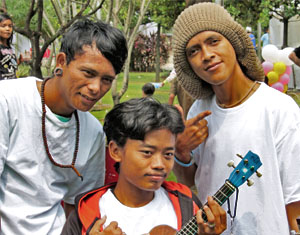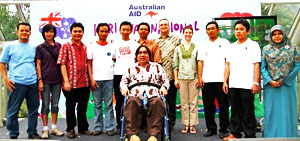Komprang was once detained for playing music on a train. When police searched his pockets and found drugs, he was imprisoned. After spending more than three years in jail, the 20-year-old is playing music again but he's now performing on a very different stage.
Komprang and his friends and band members, Ipay, 20, and Diken, 17, have lived most of their lives on the street and all served time in prison as children. But it was only when the Indonesian Legal Resource Centre came to their half-way house that the boys learnt about their legal rights.
The rights of children in Indonesia were the focus of a recent Indonesian National Children's Day celebration organised by the Australian Government through AusAID in Jakarta.
The event was designed to raise public awareness of child protection and juvenile justice in Indonesia and to highlight Australia's support to six organisations working on these issues. These organisations provide free legal services to street children and train paralegals who work on child protection cases.
About 150 children attended the Children's Day event along with families from the Australian Embassy. While there was time for reflection about the challenges children face in Indonesia, there were potato sack races, an Indonesian prawn cracker (krupuk) eating competitions and a performance from Komprang's band.
Child protection and juvenile justice in Indonesia
More than 7,000 juveniles are in detention facilities and prisons across the nation according to the Indonesian Commission for Child Protection. In a 2011 AusAID-funded report, the Commission found that more than 85 per cent of Indonesian children who are brought to court for crimes are sentenced to prison.
Indonesia does not yet have a justice system specifically designed to deal with child offenders and law enforcers often use a punitive approach for child offenders. Treatment for children can be harsh, even for petty theft. Most children sentenced to prison are forced to share their prison cells with adult prisoners–putting them at risk of violence.
Komprang was released five months early for good behaviour. He returned to his family but was soon back on the street. He met Ipay and Diken at the half-way house for juveniles. Ipay and Diken share similar stories about detention and mistreatment from law enforcement officers. They only learnt about their legal rights when the Indonesian Legal Resource Centre came to their half-way house.
The Legal Resource Centre is one of six selected organisations receiving a $100,000 grant from the Australian Government. The Centre provides information to street children about their rights, what to do if they get in to trouble with the police, and where to go for legal assistance if they need it.
Thanks to information provided by the Indonesian Legal Resource Centre, Komprang now knows about his legal rights and how he should be treated if he comes into contact with the police again.
Australia's support
In 2011, Australia will provide six $100,000 grants to non-government organisations working to improve juvenile justice and child protection in Indonesia.
- The Indonesian Legal Resource Centre (Mitra Pembaruan Pendidikan Hukum Indonesia). They will provide free legal assistance for street children who are victims of violence, arbitrary detention and harassment.
- The Jakarta Legal Aid Institute (Lembaga Bantuan Hukum Jakarta) focuses on advocacy and prevention of child rights violations, early access to legal counsel and monitoring pre-trial treatment of children to reduce ill-treatment and arbitrary detention.
- The Indonesian Legal Aid Institute (Yayasan Lembaga Bantuan Hukum Indonesia) will develop a strategy paper aimed at improving policies of law enforcement agencies handling cases of children in conflict with the law.
- The Children Legal Aid Institute Aceh (Yayasan Lembaga Bantuan Hukum Anak Aceh) will train paralegals who specifically work on child protection cases; and increase coordination between communities, education institutions, law enforcement agencies and other government agencies on child protection.
- The Semarang Legal Aid Institute (Yayasan Lembaga Bantuan Semarang) will support parents who are involved in school committees, as well as village governments and law enforcement officials to increase the protection of children who are facing legal problems in Semarang.
- The Child Protection Body of East Java (Lembaga Perlindungan Anak Jawa Timur) aims to develop guidelines for law enforcers and lawyers on how best to deal with children when they are in contact with the law; build networks between these groups in four districts in East Java; and raise public awareness around child protection issues.


